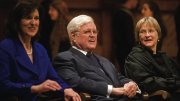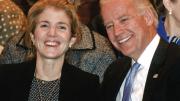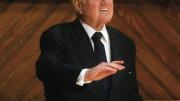“Now I have something in common with George Washington—other than being born on February 22. It is not, as I had once hoped, being president. It is instead this rare privilege of receiving an honorary degree from Harvard at a special convocation.” So said Edward M. Kennedy in Sanders Theatre on the balmy afternoon of December 1. “I am moved and deeply grateful to my university.”
Thus the long-serving United States Senator joined an even more exclusive club of those few towering leaders (also including Winston Churchill and Nelson Mandela, James Monroe and Andrew Jackson) awarded honorary degrees outside the annual Commencement exercises—in this case, because of Kennedy’s treatment for brain cancer last spring.
The ceremony was by turns nostalgic (it began with footage of Kennedy, in his Crimson number 88 jersey, scoring Harvard’s lone touchdown in the snowy 1955 Game; he also noted that his father enrolled in the College exactly a century ago this past September); stem-winding and revivalist (the huge standing ovation for Vice President-elect Joseph R. Biden, who entered just before the festivities began at 4:30, and sat next to Caroline Kennedy ’80 and across the aisle from Senator John Kerry; Kennedy’s own thundering defense of liberalism in the words of his brother, John F. Kennedy ’40, LL.D. ’56, shortly before his election as president); valedictory (Kennedy recalled, “As I said in Denver last summer, for me, this is a season of hope,” and thanked “Massachusetts for the privilege of serving its people and its principles”); and warmly funny (President Drew Faust quoted Kennedy on his model of service—“The danger as a legislator is that you get involved with just passing the bill. You can lose the context of what passing the bill means, and then you’re just shuffling papers, and you lose that emotional contact. Maybe some people could do it. I think I’d run dry pretty quick”—and then illustrated the point by referring to his weekly visits to a Washington elementary school, where he has become known for his “virtuoso rendition of ‘The Itsy Bitsy Spider.’”)
After the University Band played “Ten Thousand Men of Harvard” and University Marshal Jacqueline O’Neill called the crowd to order, Plummer professor of Christian morals Peter J. Gomes began the prayer with “Let us now praise famous men” on an occasion intended to “honor goodness as well as greatness.” James Onstad ’09 was the soloist for “America the Beautiful.”
Supreme Court Justice Stephen G. Breyer, LL.B. ’64, speaking as former chief counsel when Kennedy chaired the Senate Judiciary Committee, recalled the senator’s cooperation with Senator Strom Thurmond and his insistence that Democratic and Republican staff members “Work it out” to move business forward. On an occasion when cooperation failed and voices were raised, Breyer said, Kennedy teased him by asking, “Well, what did they teach you at Harvard about how to deal with this?” before plunging in to repair the breach. Breyer concluded, “I’m proud that this university I love is bestowing this honorary degree on an eminently deserving son of Harvard whom I admire immensely and who will forever rank among the nation’s greatest senators.…I’m proud to be here now as Harvard says, ‘Well done, Senator, and thank you for caring so much about so many for so long. Our Commonwealth, our country, and our world are stronger, fairer, and better places because of all you have achieved.’”
An exuberant Yo-Yo Ma ’76, D.Mus. ’91 (see “Yo-Yo Ma’s Journeys,” March-April 2000, page 43), accompanied by pianist Charlie Albright ’11, played two preludes by George Gershwin for his soon-to-be fellow honorand. After the pieces ended, Kennedy rose and walked to mid stage to embrace Ma.
In her remarks, Faust quoted one of Kennedy’s signature lines, from Tennyson’s Ulysses: “I am a part of all that I have met.” She then detailed his 46 years of elected public service, during which he made his own the concerns of “society’s most vulnerable members. The poor. The unemployed. The disabled. The elderly. The seriously ill. Veterans wounded in battle. Newcomers from foreign lands. Men and women facing bias in housing, in employment. Children deprived of the chance for a decent start in life.”
In light of Kennedy’s work, her own upbringing in segregated Virginia and her scholarship on the antebellum South and the Civil War, and this particular moment in American history, Faust emphasized his civil-rights leadership: “Edward Kennedy delivered his first major speech in the Senate on behalf of the Civil Rights Act of 1964, and he acted as a leader in the passage of the Voting Rights Act the following year. Nearly a half-century later, he serves as key Senate sponsor of the Civil Rights Act of 2008. He has been a voice of conscience and commitment and a model of effectiveness in this most central transformation of American life: realizing the promise of opportunity and equality for all.”
And she noted his ceaseless efforts on behalf of education—particularly support for financial aid and for biomedical research—saying, “American colleges and universities, in their long history, have had few more dedicated friends.”
“There is only one school within Harvard University named for someone other than John Harvard,” Faust observed. “That school is named for John Kennedy.” At the school’s dedication in 1978, she recalled, Senator Kennedy invoked his brother in these words:
More than any other public figure in our recent history, he believed in the power of individual citizens to make a difference, to improve their lives and the lives of those around them. He understood the awesome power of intelligence married to commitment, the irresistible force of an idea in the mind of a man or woman educated to serve the public.…His greatest gift was the ability to reach the hearts of others, to plant a seed of hope in barren lives, to nurture new ideas in fertile minds, to inspire the young to devote a portion of their lives to the well-being of their own communities and lift up others less fortunate than themselves.
Faust added, “What Edward Kennedy said of his brother 30 years ago, we see and we celebrate in his own extraordinary career.”
Preparing to confer his degree, she said, “As we do, we take profound and continuing inspiration from the vision, the reason, and the courage of the man who, even two decades ago, was recognized by my predecessor Derek Bok as ‘Harvard’s most impressive living embodiment of lifelong dedication to public service’; the man who will never let us forget that ‘the cause endures, the hope still lives.’ The Honorable Edward M. Kennedy.”
In his response, Kennedy recalled his own arrival at the College: “At home and here at Harvard, which became a second home, I learned to prize history, to play football, and to believe in public service. It was long ago, but I see it now as fresh as youth and yesterday. And I hope that in all the time since then I have lived up to the chance that Harvard gave me.”
Reflecting on his career, he said, “I have seen throughout my life how we as a people can rise to a challenge, embrace change, and renew our destiny.
So there is no other time when I would rather receive this honor than this year—at this turning point in American history.
Just one month ago, our citizens powerfully reaffirmed the promise of America. That promise has been central to my service, to the contributions of my brothers, and to the age-old dream of millions.
Long after Abraham Lincoln signed the Emancipation Proclamation, long after Brown v. Board of Education, long after a young Baptist minister stood on the steps of Lincoln’s Memorial and called the nation to the dream of equality, the moment finally is here. The time is now, the long march of progress has arrived at one extraordinary day in American history.
We elected a forty-fourth president who, by virtue of his race, could have been legally owned by the first 16 presidents of the United States. We judged him, as Martin Luther King said, not by the color of his skin, but by the content of his character and the capacity of his leadership.
For America, this is not just a culmination, but a new beginning.
Kennedy concluded, “I have lived in a blessed time. Now, with you, I look forward to a new time of aspiration and high achievement for our nation and the world.”
The Kuumba Singers then delivered a rousing version of “Ain’t Gonna Let Nobody Turn Me Around,” O’Neill closed the ceremony, Onstad led “Fair Harvard,” and the Band reprised “Ten Thousand Men of Harvard” (as Secret Service agents whisked Biden out of the hall ahead of the crowds).
As the stage party departed, Senator Kennedy, waving away his cane, lingered to give thumbs-up signs and savor the moment and the crowd, finally leaving last. In memory were the words of his honorary-degree citation:
Resolute in pursuit of opportunity for all,
dauntless in sailing against the wind,
a statesman for all seasons with a singular devotion
to country, commonwealth, and the common good.









